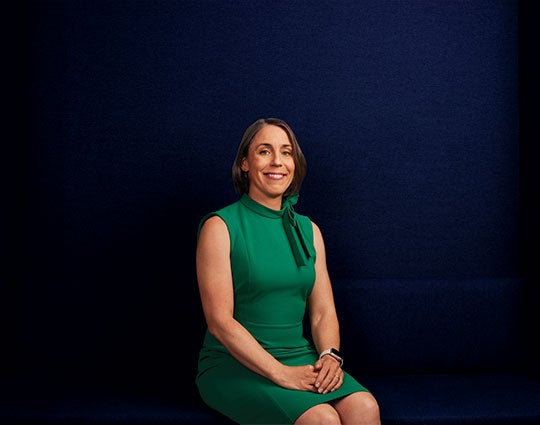An Interdisciplinary Powerhouse
Rice’s Synthetic Biology Institute will create new tools for living systems.

Spring 2024
By Mike Williams
In recent years, synthetic biology research at Rice has grown astronomically — or, more to the point, bacteriologically. The new Rice Synthetic Biology Institute, led by Caroline Ajo-Franklin, aims to take this growth even further.
Synthetic biology is the art and science of making living systems and devices able to perform essential tasks. One example, from the labs of Ajo-Franklin and Rice colleague Jonathan “Joff” Silberg, is an engineered bacteria that spots and immediately signals the presence of contaminants. The project was the subject of a 2022 paper in the scientific journal Nature.
“What made the institute necessary is that, in some ways, we’re starting to become victims of our own success,” Ajo-Franklin says. “The community here grew quite a bit over the pandemic, with 18 faculty members who are card-carrying synthetic biologists spread across five departments and five buildings. The institute is going to be an umbrella organization for faculty, postdoctoral fellows and graduate programs, including our flagship Systems, Synthetic and Physical Biology program.”
I think students want to come to a university where they know that when they leave with a Ph.D., they’re going to be leaders in their field of choice.
Partnerships with other Rice initiatives, including the Ken Kennedy Institute, known for its expertise in artificial intelligence and machine learning, and the new Biotech Launch Pad, with its many connections to Houston’s medical community, will be critical in bringing Rice’s synthetic biology technologies to the public.
“I think students want to come to a university where they know that when they leave with a Ph.D., they’re going to be leaders in their field of choice, whether that’s academia, government labs, entrepreneurship, science policy or tech transfer,” Ajo-Franklin says.
Ajo-Franklin sees great potential for new applications and opportunities as the discipline of synthetic biology grows. “We need to develop partnerships that extend outside of Rice that involve translation and commercialization,” she says. “And we need to make sure that policymakers in D.C. are aware of our capabilities — and the challenges we’re encountering, too.”
Learn more at synbio.rice.edu.
